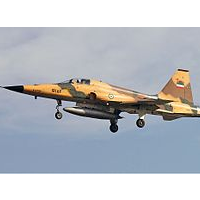Obama’s Deregulation of Weapons Exports Could Help Iran, China and other Dictatorships
 Iranian F-5 Fighter Jet
Iranian F-5 Fighter Jet
The Obama administration has been accused of loosening export rules and making it possible for regimes in China, Iran and other countries to buy American-made military hardware and equipment.
Last fall, President Barack Obama put forth the Export Control Reform Initiative (pdf) that put more decision-making on military-related exports in the hands of the Department of Commerce.
Historically, Commerce and the State Department have jointly regulated these exports, with the former generally pushing for more sales to help U.S. corporations expand their foreign earnings, while the latter has focused on limiting such sales to reduce arms proliferation that might endanger U.S. security interests.
The initiative—whose stated purpose includes allowing U.S. arms manufacturers to better compete in the global arms market with foreign weapons makers—has prompted criticism from many U.S. officials who claim the new export rules will allow the Chinese and Iranians to acquire important U.S. technology. The U.S. is already the leader in world arms sales, reportedly with a lock on nearly 80% of the market.
It is not complete U.S. weapons systems but “seemingly innocuous” military parts that foreign countries, including our adversaries, often focus on acquiring, according to U.S. Department of Justice releases cited by the Project on Government Oversight (POGO).
Tehran, for example, has sought to bolster its air force by obtaining American military parts for use in F-5 fighter jets (manufactured by Northrop Grumman) and the CH-53 Sea Stallion helicopter (built by Sikorsky).
Meanwhile, the Chinese have improved their missile and satellite technologies with stolen radiation-hardened microchips made in the U.S. But China might simply be able to legally purchase such technology going forward under the Obama administration’s initiative.
“While the Obama Administration says it will maintain strong controls on military items that give the U.S. military and intelligence community a technological advantage, they are significantly weakening controls on many military parts,” Colby Goodman, a consultant with the Open Society Policy Center and a former member of the United Nations Office of Disarmament Affairs, wrote at POGO. “Yet, there has been relatively little public attention or congressional oversight of this dramatic deregulation of arms export controls.”
Obama’s plan resulted in tens of thousands of military items being taken off the State Department’s export-control list— known as the U.S. Munitions List (pdf), or USML—and shifted to Commerce’s “more loosely controlled” Commerce Control List (pdf) (CCL), Goodman says.
This is bad news, he claims, because the “CCL lacks many controls that are key to protecting against the proliferation of military technology and weapons systems.”
Also, the changes could undermine the efforts of U.S. prosecutors to go after companies that illegally sell military hardware to dangerous governments, he adds.
-Noel Brinkerhoff
To Learn More:
Growing Concerns Over Deregulation of Arms Export Controls (by Colby Goodman, Project on Government Oversight)
Shortsighted Arms Deregulation (New York Times)
Obama Rewards Weapons Makers by Easing Restrictions on Arms Exports (by Noel Brinkerhoff, AllGov)
- Top Stories
- Unusual News
- Where is the Money Going?
- Controversies
- U.S. and the World
- Appointments and Resignations
- Latest News
- Musk and Trump Fire Members of Congress
- Trump Calls for Violent Street Demonstrations Against Himself
- Trump Changes Name of Republican Party
- The 2024 Election By the Numbers
- Bashar al-Assad—The Fall of a Rabid AntiSemite






Comments